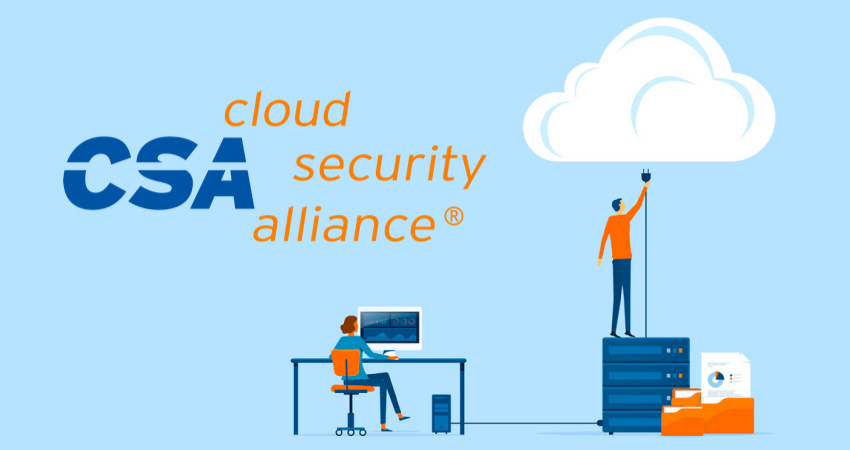The Cloud Security Alliance (CSA), which was founded in 2008, is an organization dedicated to identifying as well as communicating awareness of resources and recommended procedures for ensuring a reliable and extensible cloud security computing environment.
The CSA is in charge of the CSA Security, Trust, and Assurance Registry (STAR). The STAR registry catalogs the privacy and security safeguards offered by standard cloud computing services. This publicly accessible registry enables cloud customers to evaluate their security providers and make the best purchasing decisions possible.
They offer additional programs, roadmaps, and certifications, such as the highly sought-after Certificate of Cloud Security Knowledge.
What is the Cloud Security Alliance?

The Cloud Security Alliance (CSA) is a non-profit group that supports research into best practices for cloud computing security as well as the use of cloud technologies to safeguard other forms of computing. CSA draws on the knowledge and experience of industry practitioners, associations, and governments, as well as corporate and individual members, to provide cloud security research, education, certification, events, and products.
The activities, knowledge, and extensive network of the organization help the whole cloud community, such as cloud service providers, entrepreneurs, customers, and governments. The CSA also provides a forum for all parties to collaborate in order to build and maintain a trustworthy cloud ecosystem.
The industry group additionally offers security awareness and advice to businesses at various stages of cloud adoption, as well as assistance to cloud service providers in addressing protection in their software delivery models. Any interested party with the expertise to make a contribution to the security of cloud computing can join the CSA.
Areas of study for the Cloud Security Alliance
The CSA directs a number of active research initiatives that produce white papers, tools, and reports to assist businesses and vendors in securing cloud computing services.
There are CSA working groups that address almost every aspect of cloud security and target 38 different cloud security domains. These are some examples:
- The Cloud Data Governance Working Group develops principles and applies them to emerging techniques and technologies in order to ensure data privacy, availability, confidentiality, integrity, and security across public and private clouds.
- The Cloud Security Alliance IoT Working Group develops relevant use situations for internet of things (IoT) implementations as well as actionable guidance to help security practitioners secure their deployments.
- The CSA Application Containers & Microservices Working Group conducts research on application container and microservice security. It is also in charge of publishing best practices and guidelines for the safe use of application containers as well as microservices.
The SaaS Governance Working Group seeks to encourage as well as define mechanisms to promote cooperation and assist vendors and customers in working closely together to handle software-as-a-service risks, ensure the security of customer data, and ensure the resilience of the SaaS public cloud.
Partnerships and CSA programs

The CSA also provides a number of programs and partnerships, such as the Cloud Security Alliance Global Consulting Program, which allows cloud consumers to collaborate with trusted security experts as well as companies that can provide qualified professional services based on CSA best practices.
This program’s providers include:
- BH Consulting is a non-profit consulting firm specializing in data security consulting, cybersecurity, ISO 27001, risk assessment, cloud security, cloud, and digital forensics, incident response, and training.
- KPMG is a professional services firm that offers auditing, taxation, and advisory services.
- Optiv is a provider of cybersecurity solutions that assist businesses in planning, implementing, and managing successful cybersecurity programs, whether on-premises, in the cloud, or in a hybrid cloud computing environment.
- Securosis is a research and advisory firm focused on developing and implementing techniques to accomplish a greater degree of security in the cloud than in corporate data centers.
- The CSA Security, Trust, and Assurance Registry is a program for cloud security assurance. STAR incorporates the values of transparency, rigorous auditing, and standard harmonization. The STAR program provides several advantages, such as “indications of best practices but also verification of security posture of cloud offerings,” said the CSA website.
Furthermore, the CSA Code of Conduct for GDPR Compliance provides a consistent and comprehensive framework to assist businesses in complying with the European Union’s GDPR. The CSA Code of Conduct provides a GDPR compliance tool in addition to transparency guidelines regarding the degree of data protection provided by a cloud service provider.
Membership in the CSA
The Cloud Security Alliance provides 3 levels of membership:
- Corporate Membership for Solution Providers provides members with the opportunity to learn about the latest cloud developments, showcase their expert knowledge to a global audience, and connect with users.
- Corporate Membership for Enterprises provides members with information, tools, and guidance to help them maximize the value of their cloud investments.
- Individual Membership provides an individual congratulatory membership that depends on a certain level of participation to any person with involvement in cloud computing as well as the expertise to help to make it more secure.
- There are currently 80 global chapters, 90,000 individual members, and 400 corporate members in the CSA.
